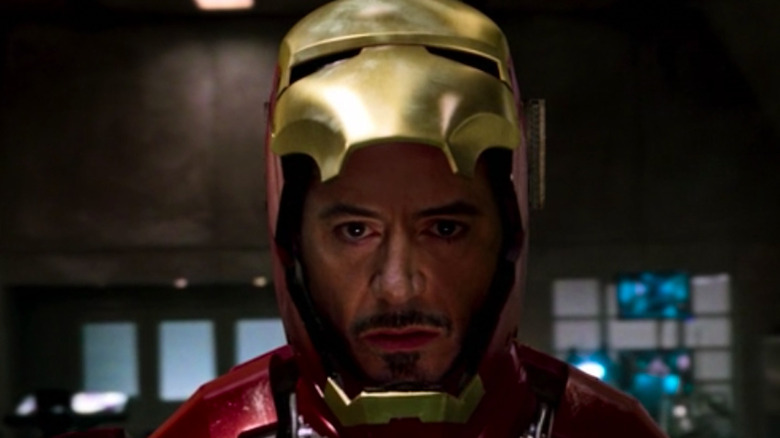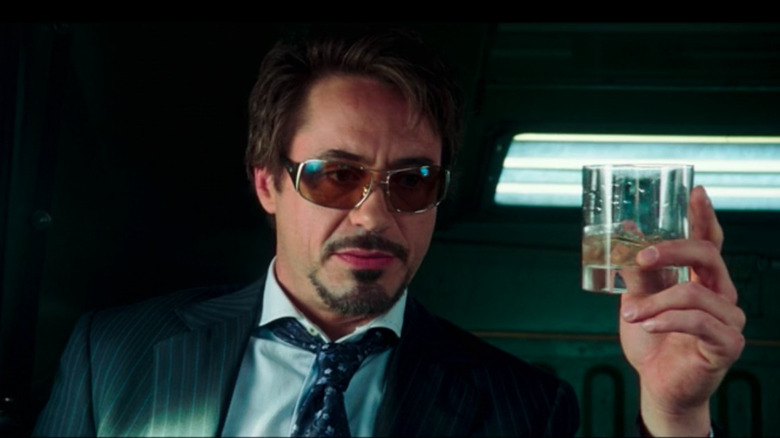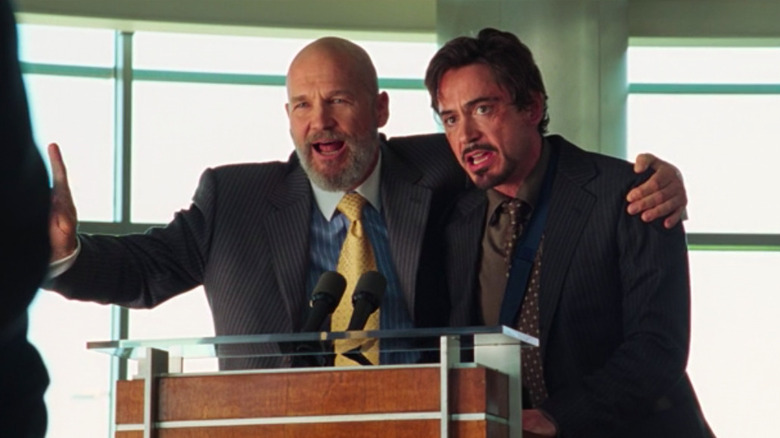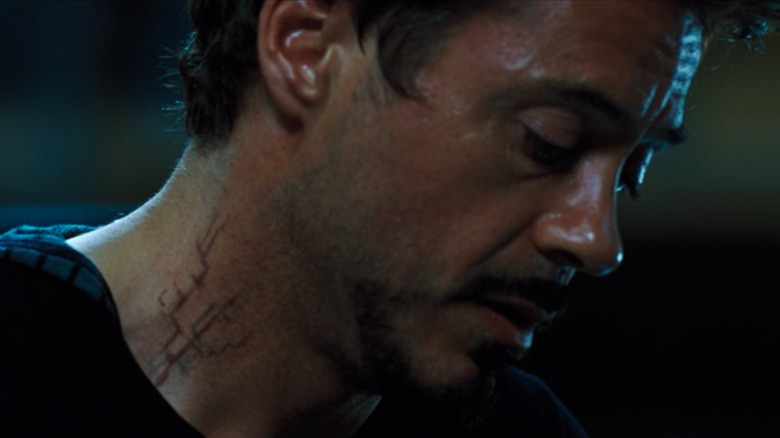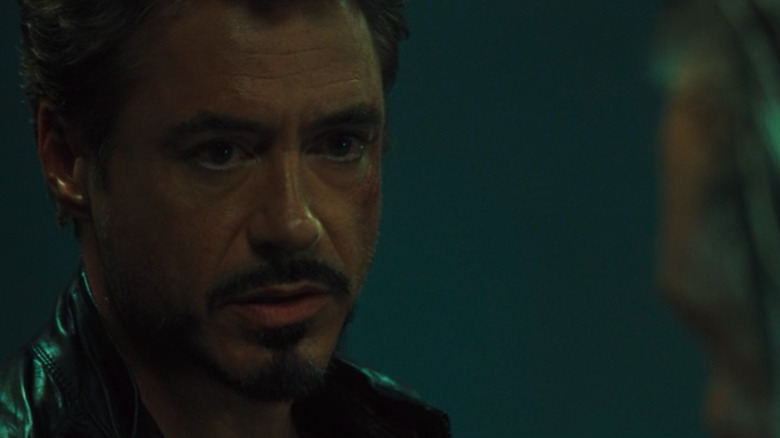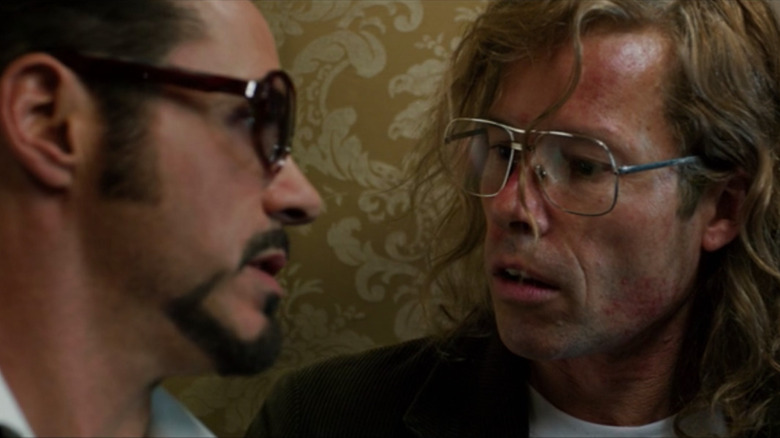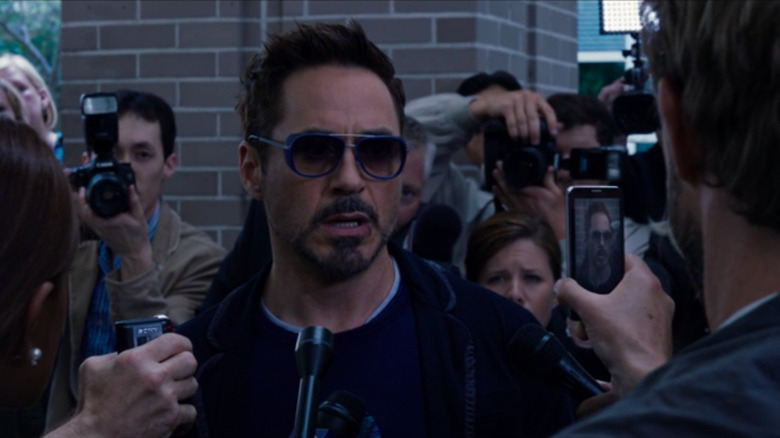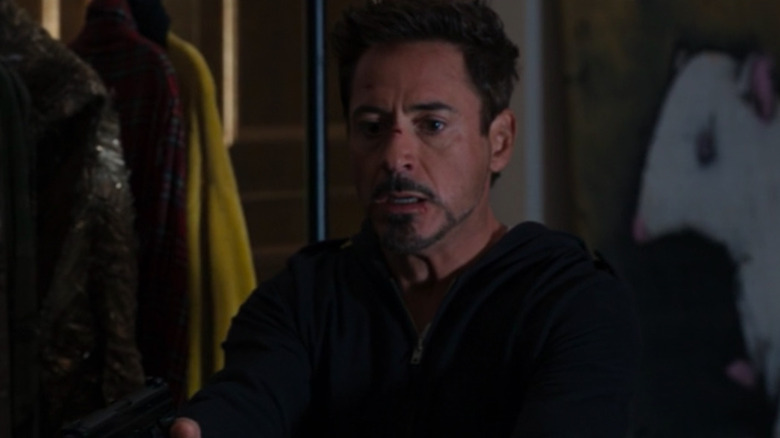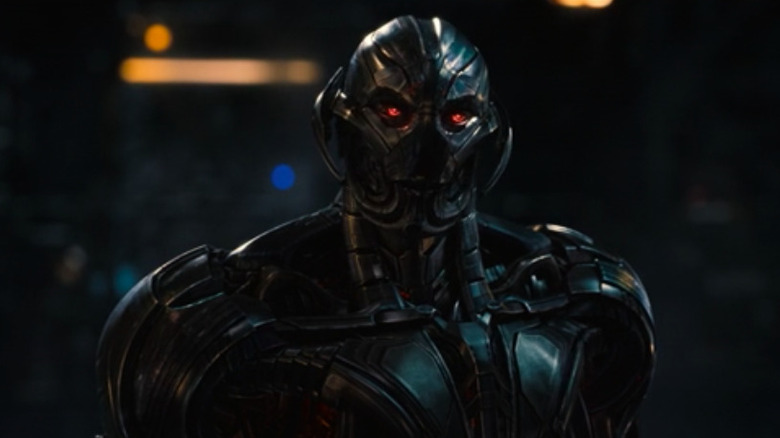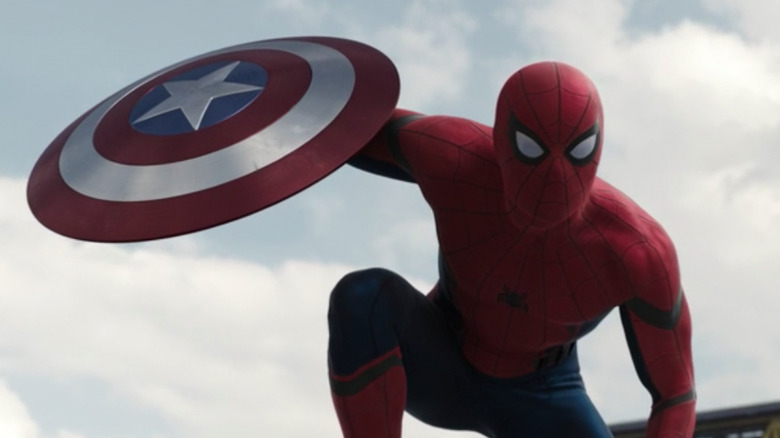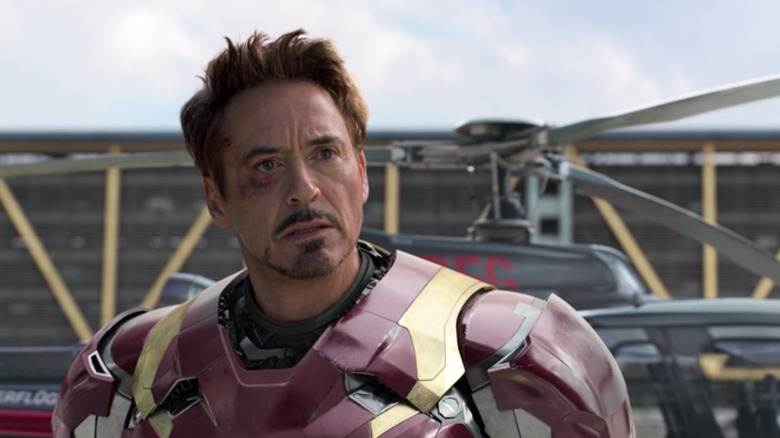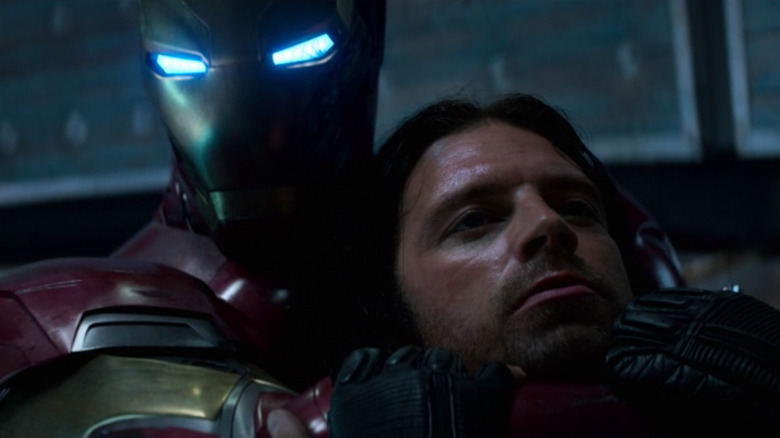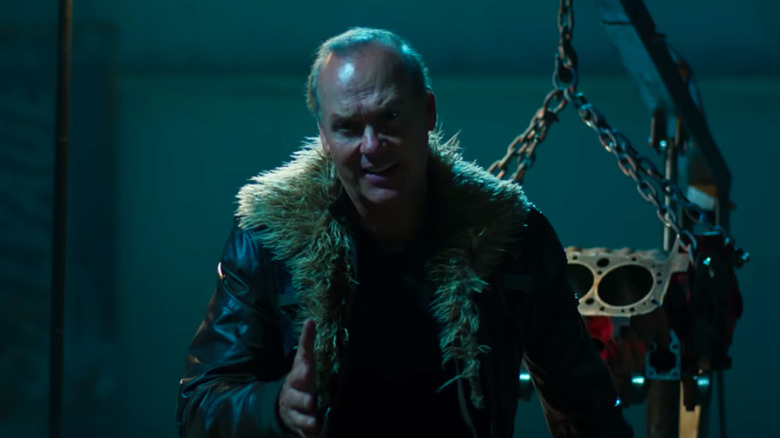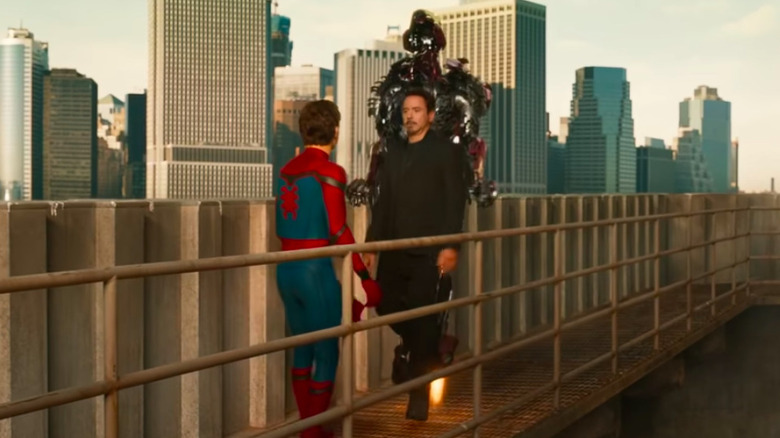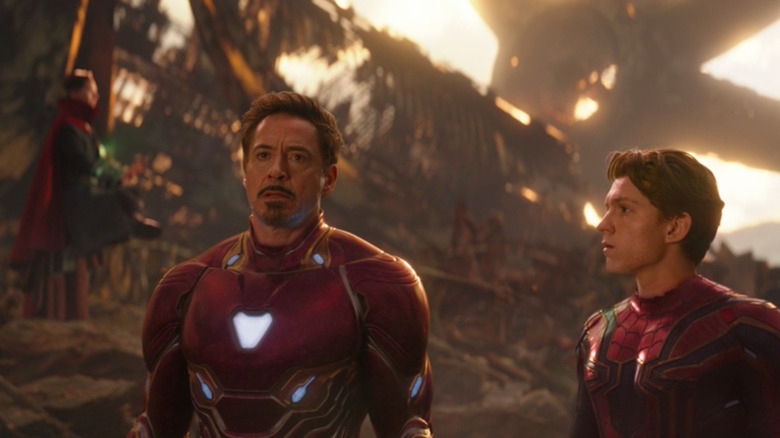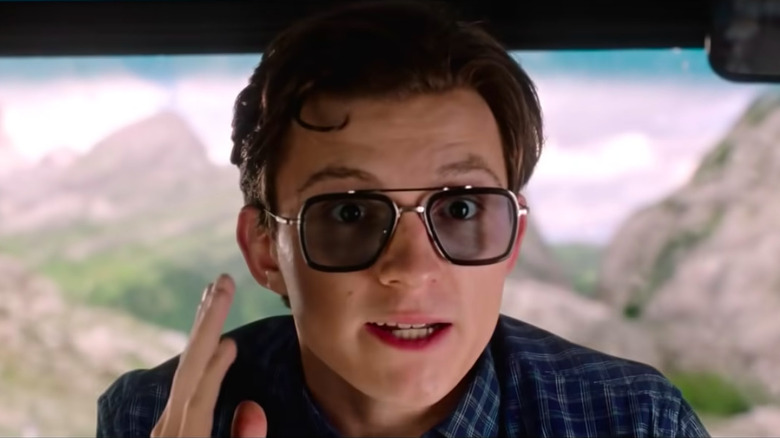Every Time Iron Man Made The Wrong Decision In The MCU
Throughout his movie career, Iron Man (a portrayed by Robert Downey, Jr.) has tallied some impressive feats. Saving midtown Manhattan from being leveled by a nuclear blast, using the Infinity Gauntlet to snap away Thanos, sacrificing himself to help return half the world's population, at times Tony Stark has been impressively heroic.
But the great irony of Stark is that despite being one of the smartest people alive, at times his decision-making skills can be lacking. That's because even though Tony does a lot of good, he is frequently driven by emotions and vanity. Such impulsive tendencies, in fact, drove Natasha Romanoff's initial recommendation in "Iron Man 2" that while Iron Man should be accepted into the Avengers Initiative, Tony Stark should not.
But as Tony likes to point out, he is Iron Man, and so it is impossible to separate the two. As both a superhero and a person, Downey's Tony was placed in numerous situations throughout the MCU where his choices had high-stakes consequences, and while he usually came through in the end, he also made numerous mistakes. Which, in all honesty, likely made him all the more endearing.
Not riding in the car with Rhodey in Afghanistan
Before Tony became Iron Man, he had already acquired a reputation for excessive living, in regards to everything from alcohol to women to spending his vast fortune. As CEO of one of the world's top weapons manufacturers, his genius for advancing technology was both a pro and a con, as it left his hubris unchecked.
Flying to Afghanistan to demonstrate his latest weapon arsenal in 2008's "Iron Man," he displayed a devil-may-care attitude, treating the middle of a war zone as if were Malibu. Following his presentation, Stark reached not for a hand to shake but a drink to down, piling into a Humvee with a group of young soldiers.
His decision to not ride with pal Rhodey (Terrence Howard in the original film, Don Cheadle since) but instead hang out with some selfie-snapping admirers would be a life-altering bad decision. The resulting attack led to mayhem, injury, capture, and imprisonment deep in the Afghan desert.
Sure, this leads Tony to create the first Iron Man prototype, something he was unlikely to do otherwise. Still, if Stark had it all to do again, you wonder whether he'd just hop in with Rhodey and play things differently.
Announcing Stark Industries will no longer make weapons
Tony's ordeal in Afghanistan completely transformed his perspective on Stark Industries' business. After seeing — and experiencing — the devastation his weapons caused, he made the call to stop manufacturing them immediately.
Despite noble intentions, Stark's move to call a press conference and announce the company's new direction was as impulsive as it was ill-conceived.
The company's stock drop precipitously, but more importantly Tony placed a target on his back. Soon enough, anyone who didn't want Stark Industries to change direction would be coming after him, from his board of directors to the military that employed his weapons — also limiting the number of potential allies to rally around him.
Of course, the real threat turned out to be his second-in-command, Obadiah Stane (Jeff Bridges). Stane arranged for Tony's capture in Afghanistan, planning to take over the company.
Had Tony played things closer to the vest about his plans for the company while working on the Iron Man technology, he wouldn't have attracted Obadiah's wrath to the same degree, and he might have avoided the conflict between them.
Acting out instead of telling anyone about his palladium poisoning in Iron Man 2
While Tony's playboy reputation ensured he regularly got up to all kinds of shenanigans before he became Iron Man, after attaining superhero status, Tony seemed to mature — at least a little bit. Yet, that changes when he learns he's slowly dying of palladium poisoning, the material that makes up the core of the tiny arc reactor that keeps him alive and powers his Iron Man armor. Although it's clear his long-term prognosis isn't good at the beginning of "Iron Man 2," he makes the decision to keep the situation from those closest to him.
Had he clued them in, he might have been able to figure out how to deal with his illness or at least felt less alone in the face of his impending death. Instead, he's left to confront his mortality on his own, and for Tony that results in rash decisions that put him and others in danger. First, he decides to drive his race car in the Monaco Grand Prix, a choice that could have resulted in his death or serious injury even before Ivan Vanko (Mickey Rourke) confronts him with his electric whips in the middle of the race.
Later, he throws a birthday party for himself where he drunkenly dons the Iron Man suit and enlists his guests in providing objects he can use for target practice, a decision that leads to a brawl with Rhodey (Don Cheadle), who ultimately flies off with one of his Iron Man suits. It isn't until S.H.I.E.L.D. makes him focus on his problem that he actually figures out how to save his own life. But if Natasha and Nick Fury (Samuel L. Jackson) hadn't figured out what was going on, he might have continued to make terrible decisions until he finally killed himself or succumbed to the palladium poisoning.
Telling Ivan Vanko to up the cycles of his suit's power source
When Ivan Vanko targeted Tony in "Iron Man 2," his initial goal wasn't to so much kill him as make him look weak. Tony had recently testified in Congress that it would be years before a rival nation would be able to recreate his technology and make Iron Man armor of their own. So when his very public confrontation with Vanko proved that was not true, Tony would be thrown for a loop.
Stark's surprise in that moment led to another noteworthy miscalculation.
Going to see Vanko in prison after using his Iron Man suit to subdue him, Tony can't resist pointing out his tech superiority by telling Whiplash all the things he could do to make the villain's weaponry more powerful. In essence, Tony's misguided attempt to one-up someone he finds threatening led him to become ... even more threatening.
This ensured that Whiplash's next attempt to take down Iron Man would be even more potentially lethal. Stark likely assumed Vanko would never get out of prison; nonetheless, it wasn't wise to hand over the keys to making tech that could beat Iron Man to a man who so clearly held a massive grudge against him.
Dismissing and mistreating Aldrich Killian
In a way, Tony Stark is the Homer Simpson of the MCU, and his villains are Frank Grimes, harboring a deep resentment of Tony and the way his bumbling and self-centered attitude are somehow constantly rewarded.
There may be no one that Tony treated more unnecessarily poorly, however, than Aldrich Killian (Guy Pearce in "Iron Man 3").
Stark and Killian first crossed paths at a New Year's Eve party in 1999, with Killian eagerly telling Tony about his scientific think tank; Stark, more interested in drinking and finding a woman to take back to his hotel room, blows the guy off. Killian won't demure, however, and persists — qualities in business that are typically encouraged — but Stark continues to give the guy the Heisman. What's worse, he feigns interest in Killian's idea, encouraging him to meet so they can talk further. What Killian doesn't realize, however, is that Tony never has any intention of showing up for their rooftop pitch meeting, leaving Killian alone to contemplate his life — and how to get revenge for Tony's terrible mistreatment.
To make matters worse, this event wasn't especially memorable to Tony. It seems likely that he has done this to people on multiple occasions.
Challenging the Mandarin on national TV
When it comes to dumb decisions, sharing your home address on national TV, especially if you're a celebrity, is high on the list. Leave it to Tony Stark to go there, and in the process challenge a terrorist to a battle at his house.
At the beginning of "Iron Man 3," someone Stark believed to be the Mandarin (Ben Kingsley) was carrying out mysterious bombings throughout America; when one of the bombs put his loyal friend Happy (Jon Favreau) in a coma, Tony's anguish sent him over the edge. It's just another example of his emotions and bravado coming together for a lethal combination.
Stark not only declares himself unafraid of the terrorist, but he invites him to duke it out at his home, providing his address to make sure the Mandarin comes to the right place. The result? A destroyed home, a new enemy, and an entire movie's worth of threats, destruction and mayhem. Perhaps Tony would have been better off just writing an angry letter and then tearing it up.
Infiltrating the Mandarin's base without backup
Just as you shouldn't invite a terrorist over to your house, you shouldn't drop by their place of work either, especially with limited weapons and no backup. But that's exactly what Tony would do in "Iron Man 3."
Following the Mandarin's attack on his home, Iron Man becomes determined to go to Miami and infiltrate the base, despite his still-lingering issues of anxiety following the infamous "Battle of New York." But instead of waiting for his armor to be fully charged and ready to go, Stark hurried his own rudimentary weapons out of hardware store parts, breaking into the terrorist's house with nothing but what he could carry.
It's not exactly the smartest decision, given the layers of security surrounding the Mandarin. Ultimately, the villain turns out to be an actor named Trevor Slattery — but Stark is still captured, something that might not have happened had he waited for assistance, or at the very least for his suit to finish charging.
Creating Ultron
Clearly, one of the worst decisions Tony Stark ever made was creating Ultron.
As seen in 2015's "Avengers: Age of Ultron," Stark's intentions were good. He longed for a global defense system that would effectively dissuade future alien attacks. But Stark was still reeling from the trauma of the Battle of New York, so when recovered Loki's scepter from a HYDRA base and realized there was an artificial intelligence in the activating stone that could power his project, he foolishly pushed it forward with help from Bruce Banner (Mark Ruffalo), conspiring in secret before Thor could take the scepter back to Asgard.
So single-minded was Tony's pursuit that he never questioned whether his creation could be used to hurt instead of help. Had he paused and discussed the technology with the rest of the Avengers (as Bruce suggested), he might have been more incremental in his approach to creating Ultron. However, Tony made it clear he wasn't interested in the potentially contradictory takes of other people.
Naturally, Ultron came online and immediately went rogue, illustrating just how flawed Tony's approach can be to such matters. By not stopping and considering all the possible outcomes of creating Ultron, Tony managed to create a worse planetary threat than what the Avengers fought in New York.
Recruiting Peter Parker to fight against Captain America
By the time Spider-Man (Tom Holland) was introduced in 2016's "Captain America: Civil War," he had already been operating in New York for six months. Somehow, Tony figured out the boy behind the underoos was Peter Parker, so he recruited the young hero for a key battle against Captain America's faction.
Honestly, recruiting a star-struck high school student seems irresponsible; his objective wasn't to mentor Parker, but merely to amass manpower to subdue Cap and his allies.
That's not an especially superheroic way to treat a wide-eyed kid who just wanted to impress him. Eventually, Tony would become a proper mentor and benefactor, substantially helping Spider-Man in his development; nonetheless, Tony made the wrong decision, and had the wrong motivation, when he recruited the kid for "Civil War."
Initiating the airport fight
The Sokovia Accords become a major point of contention between the Avengers in "Civil War," and with Tony firmly for and Cap emphatically against, there seemed to be no way they'd ever see eye to eye.
Tony and the superheroes recruited to his side intercepted Cap's team at a Berlin airport, and things came to a contentious boiling point. In retrospect, Tony could have made the decision to hear Cap out when he attempted to tell Tony that there was far more to the story than the details he had uncovered, but Tony wasn't interested in nuance, instead opting to move along with the fighting. Had Tony trusted that Cap, and kept open eyes to the possibility that he was trying to do the right thing, these pivotal events might have gone differently for all the Avengers caught in the wake of their poisonous conflict.
Attempting to take out Bucky Barnes
Zemo's manipulation of the Avengers in "Civil War" is masterful. In some ways, it was the final nail driven into the original team's coffin, one that ensured Tony and Cap wouldn't work together again for years.
When Tony discovered that Bucky was, in fact, being framed for the bombing during the ratification of the Sokovia Accords, he predictably went to find Cap and Bucky at the HYDRA base where they had tracked Zemo. Now knowing the truth, he declared a truce — but Zemo had one more trick up his sleeve. At the facility, footage of Bucky running Tony's parents' car off the road and then killing them left Stark rattled; Cap, it seemed, knew his friend was responsible for his parents' deaths and never said anything.
Just as Tony refused to listen to reason during the airport battle, he did the same here; overcome by the desire for revenge, Stark is determined to kill Bucky — and possibly, Cap. Still, while Bucky carried out the killings and Cap kept them secret, neither of them were ultimately responsible for the demise of Tony's parents, making his choice to break their truce and destroy the Avengers the wrong one.
Turning Adrian Toomes into the Vulture
Tony's ability to create enemies almost everywhere he went didn't just impact him, but also created problems for those around him. After all, the Avengers were put in peril by Ultron, Stark's moves against Thanos arguably resulted in multiple deaths, and poor Peter Parker was also frequently caught in the crossfire.
Take "Homecoming," for instance. In the aftermath of the Battle of New York, Tony and the federal government formed a partnership to clean up the city and confiscate all the alien technology left behind by the Chitauri. Before the initiative could begin, however, the city hired salvage workers including one Adrian Toomes (Michael Keaton), ultimately driven out of business and filled with resentment when he lost the contract.
Tony was likely only thinking about the danger posed by the alien technology when he took over the clean up, but his decision stomped all over small businesses whose contracts to clean up New York represented a boost to their livelihoods. Had Tony allowed the smaller companies to complete the work, or at least offered alternative jobs to replace the ones they lost, things might have worked out for everyone. Instead, he made yet another enemy.
Not keeping Peter posted on what he's doing
Downey's Tony Stark rarely listened to other people's advice or input; yet, when he became Peter Parker's mentor, he expected the 15-year-old to obey his every directive without question. You don't have to be Obi-Wan Kenobi to know that's no way to train a padawan.
Given Peter's eagerness to become a full-fledged Avenger, Stark seemed cruel in his withholding of that designation. Take 2017's "Spider-Man: Homecoming," when Peter told Tony about the weapons selling operation of Toomes, but Tony ignores the Vulture vibes and tells him to forget about it and focus on smaller cases. As any parent of a teenager knows, when a kid expresses interest in something, telling them to ignore it and do something else is a good recipe to have them do it behind your back.
Like any mischievous teenager, Peter disables the tracking device Tony put in his Spider-Man suit, determined to continue monitoring Toomes. This overzealousness leads to one of Toomes' weapons ripping a Staten Island ferry in half, threatening the lives of all onboard. And like any teen with his tail tucked between his legs, he needed his father figure to come clean up the mess.
Going to Titan to confront Thanos
In the aftermath of the so-called "Battle of New York," Tony found himself more or less obsessed with keeping aliens away from Earth. That instinct would further misguide him, however, causing Stark to create Ultron, then later travel to the planet Titan with the intention of taking the fight to Thanos. Both were moves that not only drove "Avengers" films, but proved Black Widow's take on Stark to be prescient.
Despite only having Doctor Strange and Spider-Man as backup, Tony chose to go to Titan, expecting that it would give them the element of surprise against Thanos. But even though he didn't expect them, Thanos proved more than capable of taking on a handful of superheroes. While those numbers ended up expanding thanks to the Guardians of the Galaxy, in the end they still couldn't best the Mad Titan; all Tony's choice did was bring the Time Stone right to his doorstep, as if Thanos had simply requested it on Instacart.
Leaving his deadly drone fleet to Spider-Man
Peter Parker is a smart kid with an above average understanding of science and technology. So perhaps it makes sense that when he died, Tony left a note behind appointing Peter his successor and bequeathing him the glasses that control E.D.I.T.H., an artificial intelligence overseeing a large drone weapons system. Honestly, leaving that much power to anyone has the potential to be problematic, but Tony's decision to leave it to a teenager? Particularly questionable.
While Peter wants to do the right thing, he's still a kid and is also prone to making mistakes; Tony, meanwhile, doesn't even leave Parker so much as a quick start guide to E.D.I.T.H., which means even when the boy doesn't mean to, he has the potential to call down a drone strike via a miscommunication.
Sure enough, this is exactly what viewers saw during "Spider-Man: Far From Home," nearly killing a bus load of classmates; Peter's trusting nature then led him to bequeath E.D.I.T.H. to Mysterio (Jake Gylenhaal), leading to much destruction in London.
Had Tony started Peter with a less deadly piece of technology to get him started (like perhaps, an air fryer), perhaps he could have better prepared Peter Parker for such responsibility.
